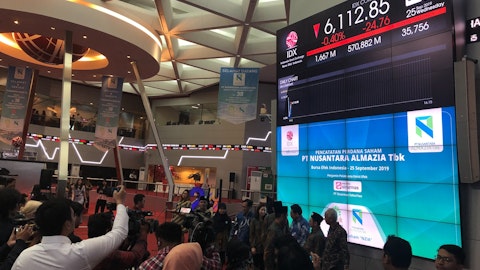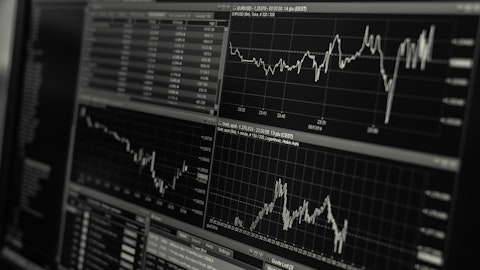Ramon Laguarta: Yes. Good question. Obviously, as Hugh was saying, we continue to drive the transformation of the business with automation at the center of it and digitalization as well. With digitalization, we’re trying to obviously give much more precision to our decision-making across everything we do from how we talk to consumers, how we invest in our pricing with our customers? How we run our end-to-end operations from agro to the consumers? How we run our routing and everything all these activities that we do to generate value for our consumers. That is an investment we’ve been making over time. And we continue — that still is the priority of the company to make the company more precise on intelligence and empower our front line to make better decisions all the time with the best information possible real-time and ideally forward information.
So that is a continuous investment. Now when it comes to Instacart, there is a commercial relationship trying to enhance the capabilities of our DSD system with the shoppers that they have in store, and that is a continuous focus. I think DSD continues to be a competitive advantage. And I think we can enhance that capability with supporting activities from the Instacart shoppers. And that commercial relation led to a very minor investment in Instacart. And just to reinforce the commitment to the commercial relationship, there’s nothing more than that in terms of a strategic long-term intentionality with that investment.
Operator: Thank you. One moment for our next question. Our next question comes from Stephen Powers with Deutsche Bank. Your line is open.
Stephen Powers: Hey, thanks. Two questions, if I could. One, just following up on the 24 outlook given the visibility you have on cost and the commercial planning at this point. Should we be expecting a relatively even performance and cadence of growth, both top and bottom line throughout the year? Or is there a reason to see that growth weighted first half versus second half? And then I did want to ask on Gatorade because the improvement we saw this quarter sequentially volumetrically did occur. It just didn’t occur at quite the level of improvement that we were expecting from a shipment perspective. I think we went from down high single digits in the second quarter to down mid in the third. So I just would love some perspective on how you view that business performing? Thank you.
Ramon Laguarta: Listen, we will not go into more details on ’24. We’ll cover that in February in due June time. When it comes to Gatorade, we’re very pleased with the G2DSD or the movement of Gatorade to the DSD platform over the summer. We’re seeing sequential improvement in the performance of the brand. Better performance in August that we saw early in the summer, et cetera, inventory on display and a number of secondary location, et cetera. So that move is working. On the velocity of the brand, we also saw that the brand is improving its velocity. It is true that the emergence of Prime in the category took some share from Gatorade less than other brands in the category or less proportionally to the size of the brand. But I would say Prime impacted Gatorade in a way some transactions during the peak of the season.
We’re seeing that the size of Prime in the category getting smaller as we go into the fall, which gives us very good optimism that with the new infrastructure we have with our DSD business, some of the innovation with GFit, Gatorlyte, G Zero, our powders and tablets that are being very well received by consumers that we have a very good you know we’re going to have a very good ’24 for Gatorade. So we have a stronger foundation to go into next year with potentially weaker competition. But obviously, I don’t know what their plans are.
Operator: Thank you. One moment for our next question. Our next question comes from Filippo Falorni with Citi. Your line is open.
Filippo Falorni: Hey, good morning, everyone. So, clearly, there’s been a lot of concern in the market around adoption of GLP-1 drugs in the US and the potential impact on your business. So maybe can you comment a bit of what you’ve seen so far based on your consumer studies, both on the beverage and food side? And how you’re thinking that can evolve over the next couple of years, change in consumer behaviors? And then from a Pepsi-specific standpoint, what changes can you make to adopt your portfolio to these new consumer preferences that could emerge if the adoption is greater than that? Thank you.
Ramon Laguarta: Thank you, Filippo. Good question. Listen, obviously, we’re looking at this you know along with many other positive and negative potential risk for our business and our category. So far, the impact is negligible in our business. Overall, if you take global consumption, there are obviously a lot of question marks with regards to the obesity drugs when it comes to medical testing or scalability of the usage of this or what is the impact really on consumer choices. So a lot of question marks. We continue to believe that all the structural positive trends that we had to our categories remain, and I mentioned, I referred to that earlier in the conversation. So we’re seeing urbanization as a big driver of adoption of our categories.
We’re seeing middle class development. We’re seeing lifestyle and the people snacking to eat, some meals becoming more mini-meals and much more unstructured during the day, being a big driver of our categories, both beverages and snacks. So we’re seeing a lot of tailwinds that will continue to drive our categories. Of course, we’re observing the growth of these new drugs and its potential impact. The other thing we’re looking at is our strategy sound when it comes to portfolio transformation. And everything we’ve been doing for the last five, six years when it comes to reducing sodium, reducing fat, reducing sugar, reducing the portions of our products, adding some new cooking methods to our snacks, those are all very positive trends that will help us pivot the portfolio if needed in the future.
We’ll continue to do it. Obviously, it’s one of our key strategic pillars. So again, negligible impact today, a lot of these structural trends that are in our category, I think, remain very solid and even we see them accelerating. And our portfolio strategy, we think, is very solid when it comes to a potential protection against some of these future developments 5, 10 years from now.
Operator: Thank you. Our last question comes from Brett Cooper with Consumer Edge. One moment.
Brett Cooper: Good morning. A question for you on the North American Beverage business. You’ve said in the past your goal is to hold share in that business. When you begin to add things like CELSIUS as an organic business, I’d love to hear how you assess the beverage performance and you’re looking to hold share with the own portfolio or you distributed brand as a component to hold share? Thanks.
Ramon Laguarta: Yes. Sorry, we missed a little bit of the question, but hopefully, we got what you’re trying to ask. CELSIUS obviously is part of our energy drink strategy. We said we had multiple pillars and our ability to distribute in our system, some third-party brands is part of that strategy. Obviously, CELSIUS continues to grow. We’ve doubled the distribution and the presence in store of the brand in the last year or so especially in the convenience channel, which is a key channel for energy consumption. That participation of CELSIUS in our track makes our full system more efficient. It makes our salesmen more relevant in the store. It makes our cooler more a go-to cooler in the store and those are all positive that eventually have a halo effect as well in the rest of our portfolio.
So I don’t know if I’m answering the question because really I couldn’t — we couldn’t hear it very well. But I guess you get a sense of the importance of CELSIUS in our energy strategy and the value we get from both the actual monetization of that distribution, but also the halo it has in the rest of the portfolio.
Ramon Laguarta: Okay. So thank you very much for your questions and for joining us today. And especially thank you for the confidence you’ve placed in us with your investment. We hope you all stay safe and healthy. Thank you very much.
Operator: Ladies and gentlemen, this does conclude today’s presentation. You may now disconnect and have a wonderful day.
Follow Pepsico Inc (NASDAQ:PEP)
Follow Pepsico Inc (NASDAQ:PEP)
Receive real-time insider trading and news alerts




